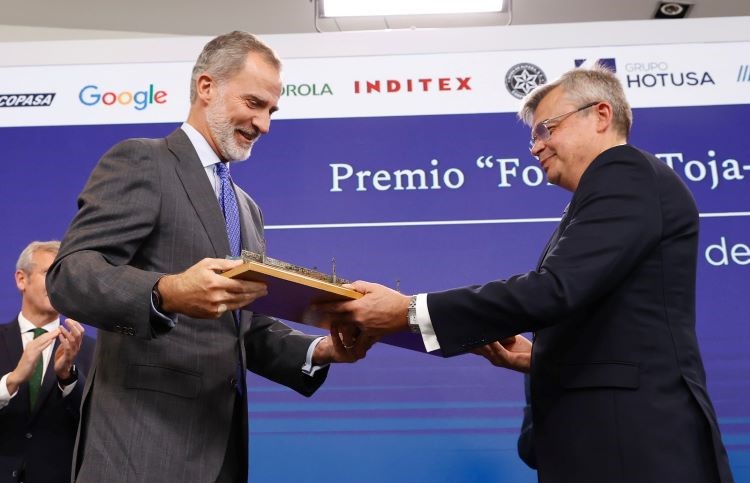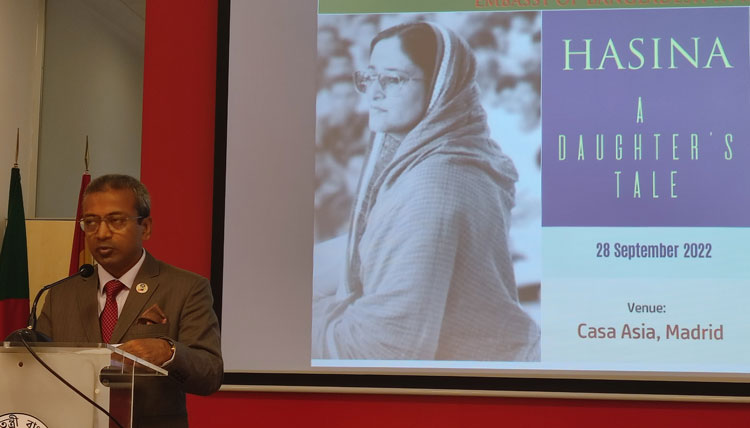The Diplomat
The war in Ukraine starred yesterday in the first day of the Forum La Toja-Atlantic Link, in which the King praised “the heroic resistance of the people” against “Russian aggression” and the Minister of Foreign Affairs, José Manuel Albares, assured his Ukrainian counterpart, Dmytro Kuleba, that Spain “will raise its voice” against Vladimir Putin’s plans to annex the Donbas region.
The island of La Toja, in O Grove (Pontevedra), hosts from yesterday until tomorrow the fourth edition of the Forum La Toja-Atlantic Link, which was attended, in addition to the Monarch and Albares, the Ambassador of Ukraine in Spain, Serhii Pohoreltsev; the President of the Xunta de Galicia, Alfonso Rueda; the High Representative of the Union for Foreign Affairs and Security Policy and Vice-President of the European Commission, Josep Borrell; the leader of the PP, Alberto Núñez-Feijóo; the President of the Forum, Josep Piqué; the President of the Hotusa Group and promoter of the Forum, Amancio López; among others.
During the event, the II Forum La Toja Award was presented, which was awarded to the people of Ukraine. “The Forum has decided to award its Prize to the brave people of Ukraine collected by its ambassador to Spain, who is with us today,” said Philip VI during the presentation of the award to the Ukrainian ambassador. “The heroic resistance of the Ukrainian people cannot be understood only as a strict defense of their territory, it is the struggle for a democratic and open society,” he continued.
“The Russian aggression has had several very relevant effects: the strengthening of the Atlantic and NATO ties, the common European response based on its strategic responsibility and the transformation of the globalization process at a juncture of changing global value chains, in which the concept of security will increasingly take precedence,” the King continued. “In any case, the success of the NATO Summit in Madrid lies in the reaffirmation of the Atlantic link and in the compatibility and complementarity of the Alliance’s Strategic Concept with the European Strategic Compass and the open strategic autonomy of the Union,” he added.
On the occasion of the Forum, a series of debates and conversations have been scheduled, with participants of the relevance of the Ministers of Defense of Spain and Germany, Margarita Robles and Christine Lambrecht; Josep Borrell, the former Presidents Felipe González and Mariano Rajoy, the Ibero-American Secretary General, Andrés Allamand; former Argentinean President Mauricio Macri, the governor of the Bank of Spain, Pablo Hernández de Cos; Isabel Schnabel, advisor to the European Central Bank; the president of the Elcano Institute, José Juan Ruiz, and the former minister Trinidad Jiménez, among others.
One of the most awaited conversations was the one held yesterday between Albares and Kuleba, in the course of which the Spanish minister assured that the Spanish government “does not give any credit” to this “mockery”, in reference to the referendums called by Putin in the regions of Donetsk, Lugansk, Kherson and Zaporiyia, and that Spain “will raise its voice to reject the annexation“. Likewise, Albares – who hinted that he might soon travel again to Kiev – insisted that the Government will continue to provide financial, military (including “defensive” weapons, because, he said, it has no other objective than to help Ukraine to defend itself) and humanitarian support to Ukraine and to support the International Criminal Court (ICC) so that “those responsible for war crimes” can be tried.
For his part, Kuleba affirmed (by videoconference) that Putin’s latest decisions (partial mobilization, annexation of the occupied territories and nuclear threat) show that “he is losing on the battlefield” and urged, therefore, to “reject his threats and support Ukraine even more”. He also thanked Spain for its support, insisted that what his country needs most are weapons and assured that the Government of Volodimir Zelenski is already undertaking the necessary reforms to achieve Ukraine’s accession to the EU “not in the long term, but in the short term”.







